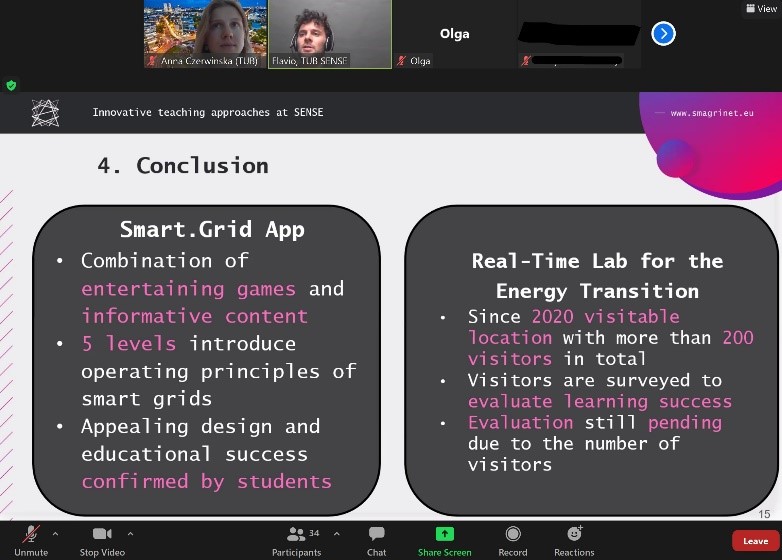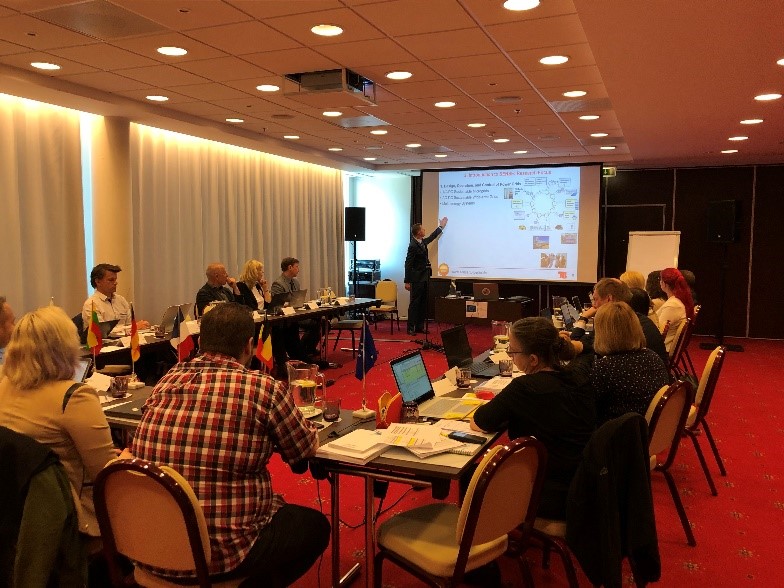Anna Czerwinska
Three years have passed since the beginning of the SMAGRINET project and one thing can be said for sure – a lot has changed. In Germany, the cumulative installed capacity of photovoltaics increased by 30 % [1], the number of registered electric vehicles rose more than seven times [2], smart meters became compulsory for all end users, with more than 6.000 kW of electricity consumption [3]. And back then, no one expected that going to a grocery shop without a face mask would be treated as a serious crime.
Also, at TU Berlin, one of the leading technical universities in Germany, we have three turbulent years behind us. Three years full of challenges, new experiences, and hard work. As one of the core academic consortium members in the project, we were responsible for Work Package 3, dedicated to building capacities for responding to emerging operational problems. This was not an easy task, since the “emerging operational problems” are indeed highly complex and demanding. And although it is not possible to find one universal solution to all of them, we as a university can definitely make a significant contribution to a successful energy transition. After all, the over 33,000 enrolled students are the upcoming engineers, researchers, managers, scientists, who are going to shape our future world.
To prepare them for this ambitious role, we developed three Case-Based Master's level teaching programmes. Based on the preliminary needs' mapping and evaluation, together with other project partners we designed various lecture and exercise materials covering the technical, economical, and societal aspects of smart grids. In January 2020, in cooperation with the University of Ljubljana, we conducted the one-week intensive course “Connection Planning in Smart Grids", in which we addressed topics such as renewable energy resources, demand characteristics, storage technologies, virtual power plants and network expansion. In September 2020, we presented our content during a similar course at ULJUB. The next step was the evaluation of the achieved piloting results, which helped us to improve the modules and offer the revised teaching programme again in January 2021 and January 2022. The positive feedback received from our participants was the best reward for our efforts and the successful implementation convinced us that we did a good job.
Furthermore, we also contributed to other project activities beyond Work Package 3. Within the scope of Work Package 4, we supported the development and implementation of short-term online learning programmes for the broader public, researchers, and workforce. Thanks to numerous videos, visualisations and explanations, the participants of these courses can discover, step by step, new trends in power systems. Together with our partners, we also organised live sessions (see Figure 1), including presentations given by external guests.

Figure 1: Screenshot from a live session
The energy transition is a global issue and it requires respectively comprehensive and interdisciplinary solutions. That is, in our opinion, one of the greatest advantages of the SMAGRINET project. The joint expertise from west and east of Europe, the exchange of experience and data brought remarkable benefits to us all. Our students were able to participate in guest lectures with international experts, which helped them not only in terms of technical knowledge, but also in terms of social and language skills. As such, they will become conscious and open-minded citizens of the future. Although the Covid-19 pandemic prevented us from realising the international mobility programme as initially intended, the online simulation activities and virtual tours provided valuable insights into the European energy system infrastructure and production facilities. Again, this substantially supports young people at the beginning of their career, because they became aware of the broad spectrum of job opportunities in the international energy market.
For us, researchers, the cooperation was in many regards fruitful as well. Although we are all facing similar problems, each of the universities has different focal points of their scientific interest and different infrastructure available. In addition, we were also given the chance to evaluate our developed technologies and algorithms in other settings - an approach that works well in Germany may not necessarily bring equally good results in France, Slovenia, Lithuania, or Estonia. And if not, by sharing our competences with others, we can improve our ideas and make them more universally applicable. Numerous consortium meetings, (see Figure 2) and calls were a great opportunity for discussions and networking. Thanks to the dissemination of the online courses beyond the consortium countries, we found potential research partners from Ukraine, with whom we have several common objectives. Also, as teachers, we could learn a lot from each other, exchanging innovative methods, creative assignments and interactive tasks. In the Train the Trainers workshop, we had the chance to step out of our own area of expertise and prepare for independent further implementations of the developed modules.

Figure 2: Consortium Kick-off meeting
"Ancora imparo" ("I am still learning") said the famous Italian artist Michelangelo. And we all are. After the three years of intensive work on the SMAGRINET project, we can state that especially in the modern, rapidly changing world, constant upskilling is of utmost importance. Hereby, the role of universities is crucial – not only are we learning ourselves, but also we are helping the future generations to acquire the skills and knowledge they need. The future is in our hands.
[1] Time series for the development of renewable energy sources in Germany, German Federal Environment Agency Section V 1.5 - Energy data, Feb. 2022
[2] Kraftfahrt-Bundesamt (German Federal Motor Transport Authority), Press release Nr. 10/2022, Nr. 5/2019
[3] Standardisation Strategy for Cross-sector Digitalisation of the Energy Transition, German Federal Ministry for Economic Affairs and Energy and Federal Office for Information Security, 2019



